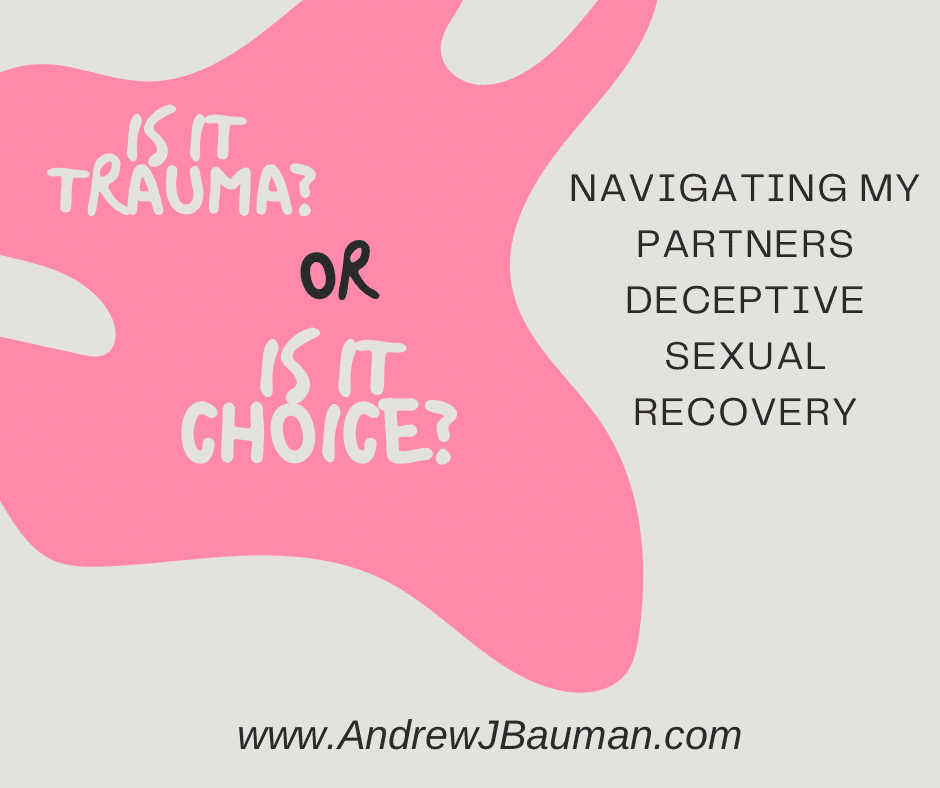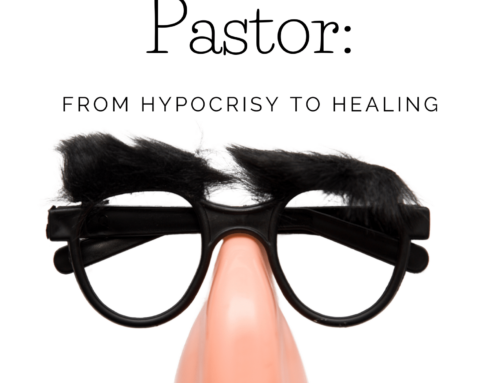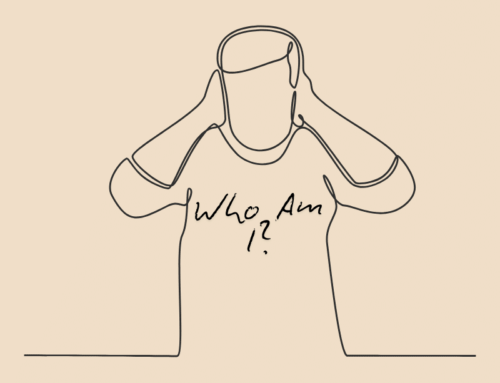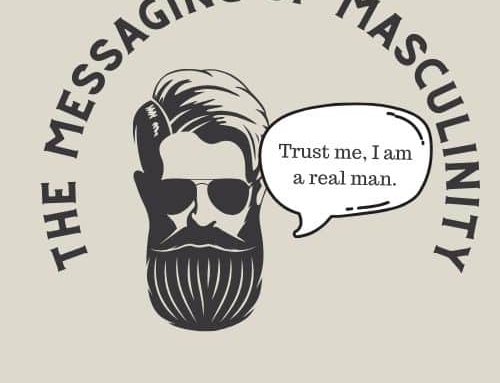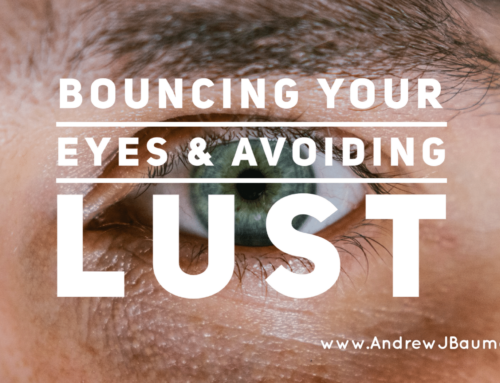There is an ongoing debate within the subculture of sexual addiction recovery and betrayal trauma circles that I would like to address. Is my husband’s betrayal of me a choice, or is it because of his unaddressed wounds and trauma? Indeed, there are lines drawn in the sand here; sides are taken, “you don’t understand sexual addiction recovery” says the man who feels misunderstood as he feels like he has been working tirelessly with the dull tools that he has been given. The other side of the debate (normally, women who have been left to pick up the pieces of wreckage left behind from their husband’s betrayal) responds with, “You don’t understand the plight of the abused woman.” Both sides leave the conversation feeling missed and even more alone in their healing journey. Both parties dig their proverbial feet deeper on their side of the street, yet I would argue only one camp of this debate has a leg to stand on. Let me explain.
Historically, this conversation has only been addressed (like all patriarchal structures) through the lens of the porn user, a.k.a. The dominant voice, many of these “healing frameworks” were created by men, for men, to benefit men if not directly then indirectly creating massive blindspots for the very men they are claiming to help heal, but these frameworks have been completely negating the experience of the abused partner. These frameworks have been mostly helpful, but also created a lot of confusion and entitlement in the holistic recovery of changing pornographic mindsets, transforming pornographic styles of relating, rebuilding relationships with beauty, altering postures of devour and objectification, overhauling our relationship with desire, and revolutionizing our relationship to our bodies. There is so much more to recovery than just stopping looking at naked women on the internet. Fortunately, courageous women have been speaking up and speaking out and this is beginning to affect change; organizations are starting to listen to women and realize how much those in sexual addiction recovery could learn in this process if they humbled themselves and listened to the people who know them best.
One of the best resources I have found in this area is the work of Dr. Omar Minwalla. I would highly encourage you to read his work if you haven’t already. Now, I would like to address this debate, Is it Trauma or Choice with a little more nuance and the care that this deserves since I am one of the few Christian practitioners trying to serve both the person in deceptive sexual recovery and the betrayed partner who has been abused. So, put on your seatbelt.
First, it is vital to know that betrayed partners have continued to be gaslighted in this area by their partners, their families, and their churches. (Note: This gaslighting is even worse in Christian subculture than it is in secular culture.) Common phrases that are heard from their partner who has lied to them are, “But I am an addict,” “It’s just my sickness,” or “But I am powerless against my disease.” Do you see how they are putting the problem outside of themselves? This is a red flag because there is a way to take responsibility for their abusive/deceptive behaviors without turning toward self-contempt or contempt toward you (which is another red flag). This “non-ownership” dynamic can be incredibly triggering for the abused because the perpetrator is still not taking responsibility for the betrayal, harm, and abuse that they have caused. Many women have also heard the line, “It’s because I had a traumatic childhood,” or “I was abused,” or “It’s because my father used to,” or “Because my mother never…” Many people have horrific childhood stories and choose different ways of coping with their tragedies; those who are in recovery have to wrestle with the shame that objectification of women, abuse, porn, or – fill in the blank – was the way they “chose” to deal with the pain of their story. They chose to use women as pacifiers for their pain; they decided to self-soothe by using women as a drug to anesthetize their heartache rather than having the courage to face it head-on. When men use these sentences as justifications for their abuse, they mock the sting of deep wounds and weaponize their own stories as an excuse to continue to perpetrate violence and adolescent misbehaviors.
Abuse is cancer to a relationship. It destroys intimacy and trust and is 100% the responsibility of the one doing the abuse. Period. I believe abuse is a male violence problem. Do women abuse? Of course, they do; some of the recent figures show one in seven men (13.9%) will be a victim of domestic abuse in their lifetime (ONS figures 2022/23) while the same research shows that one in four women (27%) will experience domestic abuse. That is twice as much! We have a male violence problem that must be addressed within men. Trauma is never an excuse for abuse, but what is trauma? How does it impact those with it and how do we address it?
What is Trauma?
It’s only in the last decade or so that the term “trauma” has been redefined in language that is easier to understand and has become a commonly used buzzword. The Greek word for trauma means “wound.” Medical doctor and trauma expert Gabor Mate, in his book The Myth of Normal, states, “Trauma is not what happens to you. Trauma is what happens inside you as a result of what happened to you.” He goes on to say that if trauma is what happens to you, that cannot be changed. Still, if trauma is the actual wound, then the wound can be healed. The fact that our traumas can be healed is one of the most hopeful and terrifying propositions. That means we have agency and even somewhat of a responsibility to tend to our trauma despite how horrific it was.
What Gabor Mate is essentially saying is that trauma is never a “choice,” but how we react to our wound is, so what will you do with your wound? How will you tend to your pain? Will you fully face it? Will you give it the kindness, attention, and care it deserves? Unaddressed trauma is constantly reenacted in our present-day relationships. Until we deal with the unaddressed trauma of our past we will continue to act out of those wounds. For you to heal your wound you must know your wound, rather than blame others for why the wound is there, or why the wound hurt when it was “touched,” a.k.a., when you got “triggered” and got defensive/reactive. Here we are talking about the trauma/wounds of the male abuser but what about the trauma/wounds inflicted by the abuser toward the victim? Is the victim responsible for her response? Well of course she is; if not, we would be taking away her very agency, but there is a term called “reactive abuse” that defines a woman’s aggressive response back to her abusive partner. It is a terrible term that has been weaponized by perpetrators of abuse to further blame women for their own abuse and position the abuser as the victim. Be aware this is a classic manipulative tactic to level the playing field, to say that “we are both abusers,” and that “we have abused each other,” remembering that anything to take the weight of sin off of their shoulders and add it onto yours will lighten their load and encumber yours. You are not equal in your abuse. Many times, because of patriarchal norms and misogyny cloaked as theological truth, we have all drunk the cult-like kool-aid of male headship and our baseline is already male-centric dominance. It reminds me of the old allegory, “If you judge a fish by its ability to climb a tree, it will live its whole life believing that it is stupid.” Many times we, as a society and a church, are holding women up to an unfair measure of climbing a tree planted by men for men, when they are fish meant for the ocean designed to gloriously swim freely. The weaponized term “reactive abuse” is merely “reactive survival” doing whatever they need to do to survive a system that is setting them up for failure and takes pride in watching them break.
What Now?
If you find yourself in this bind with your partner, then what now? Whether you are the victim or the perpetrator of abuse you can get help. There are many resources available and support systems for women in abusive relationships. Some of the resources that I trust and often refer to are, Sarah McDugal, Natalie Hoffman, BTR.org, Sheila Gregoire, Megan with Mountain City Christian Counseling, and affiliates Jessica and Nicole work with women in abusive relationships and you can reach them directly at https://christiancc.org/our-team/.
For men, this is our specialty at the CCC, www.ChristianCC.org. Our foundational innovative 4-day program is our men’s integrity retreat that is offered monthly in North Carolina. We encourage all men who are struggling with deceptive sexuality and abusive behaviors to attend this retreat and deal with the core wounds that are informing their acting-out behaviors.
Men who are ready to change may be scared, but they are not cowards; they are capable of rich and deep intimacy and emotional awareness. They know what life is like if they continue to live the way they have been living and are ready to live differently. You will “see” change, not in their words but in their actions. They will read different books, and seek out different resources, and mentors. They will process a deep humility and their eyes will change. Instead of a hardness in their face, you will see a softness and a willingness to face their shadows and become the man they have always pretended to be.
Trust the goodness of your intuition and set him free to choose to take his own path to deeper freedom or further bondage, but it is not your work, or your responsibility, his integrity or lack thereof has nothing to do with you.
Rest and be free and as you lean into this new way of being may you close your eyes and listen to a song by Sarah Siskind and my wife Christy Bauman from my wife’s new book Her Rites. She Knows (Rite of Intuition)
